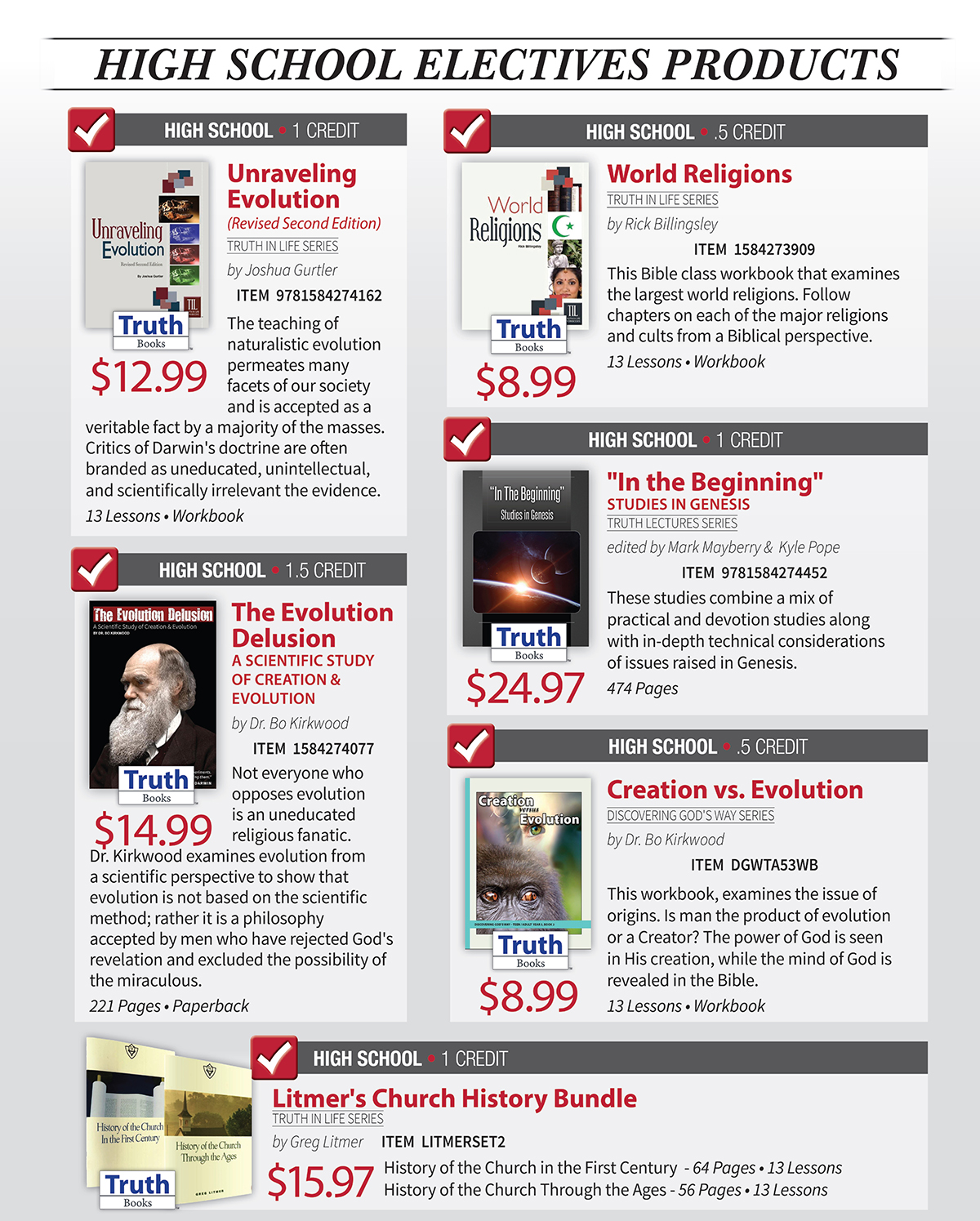by David Flatt
Synopsis: Despite Israel's widespread rejection of the Messiah, there was still hope for Abraham's descendants. David discusses how God employed the Gentiles to fulfill His covenant promises and redeem a remnant.
After reading Romans chapters 9-10, Jewish readers might have gotten the impression that God has rejected them. Yet, He had not cast away His people. This point could be proven through Paul, an Israelite who had initially rejected Jesus as the Messiah. Of course, Paul repented and accepted the truth. God graciously received him and was willing to do the same for any Israelite who would believe and obey the gospel.
God continues doing what He had been doing throughout Israel's history: saving a remnant by grace. Paul makes the same point about the remnant as he did in chapter 9, but does so now by referencing Elijah (1 Kings 18-19). Israel had rejected God and turned to idols. Through a contest at Mt. Carmel, Jehovah was shown to be the One, True and Living God. Yet, this dramatic display of divine power did not cause wayward Israel to seek restoration with Jehovah. Devastated, Elijah felt he was the only one who remained faithful. Of course, this was untrue. God revealed that there was a remnant within Israel who had not bowed the knee to Baal.
While Paul does not assume himself to be a representation of Elijah, there is a correlation between the two men. Paul was not the only Israelite who believed the gospel. He never made such a declaration. However, most Jews rejected Jesus. Paul enjoyed some success among the Gentiles, while only a remnant of Israel had been obedient.
Israel's rejection of the gospel was discouraging for Paul (Rom. 9:1-5). In his second letter to the Corinthians, Paul remarks about the struggles that he and his traveling companions experienced in Asia (2 Cor. 1:8-9). They had been pressed beyond measure and despaired of life. They operated under a sentence of death—Paul was persecuted by the Gentiles, and his countrymen, the Jews (2 Cor. 11:26). He, like Elijah, experienced emotional trials.
The essential point that Paul conveys to Jewish readers relates to the historical concept of God saving a remnant by grace. Whenever God punished Israel, He spared a remnant. After enduring periods of exile, devout Jews emerged with reshaped hearts and a renewed commitment to God. Now, as Israel had rejected the gospel, they were symbolically experiencing another period of exile. Through belief in Jesus as the Messiah, a remnant of Israel could experience a new exodus.
Of course, saving a remnant from exile through the Messiah was not due to Israel's faithfulness to God. They had not earned deliverance through keeping the Law of Moses, nor did they deserve redemption. Salvation (for Jew and Gentile alike) is not according to works of human merit, but according to God's grace (Rom. 3:21-31, 5:1-21).
Grace is an identifying trait of this new remnant. This point is illustrated throughout Paul's letter to the Romans. God's saving grace is seen in His covenant with Abraham, in His redemption of a remnant of Israel, and offering the gospel to the Gentiles. We, too, can become part of this remnant today by God's grace through our faith (Eph. 2:8-9). Nevertheless, God's grace is for naught if we do not believe.
Luke 15 contains parables about a lost sheep, a lost coin, and a lost son. In the Parable of the Lost Son, Jesus contrasted the relationship of two brothers. The older brother represented the Pharisees, and "sinners" were represented by the younger. Of course, when the prodigal returns home, he is received by his father. However, the older brother is jealous and angry at how his younger brother was welcomed back home after having wasted his father's inheritance. This parable draws on familiar themes of historical relationships between brothers: Cain and Abel, Isaac and Ishmael, Jacob and Esau, and Joseph and his brothers.
Notice the essential dynamics of these relationships: (1) Cain murdered Abel as a result of jealousy; (2) Ishmael and Isaac shared little relationship at all, living separate lives, only reuniting to bury their father, Abraham. Isaac, the younger, would become a father of the covenant nation, while the descendants of the older brother, Ishmael, would eventually form a false religion—Islam; (3) Jacob and Esau had a tumultuous relationship. Although they reconciled later in life, their respective families remained enemies; (4) Joseph and his brothers had a terrible relationship, marring domestic harmony and happiness; yet, eventually, they were reunited. So, what's the point? In each case, including the parable of the prodigal, the story ends with the exoneration of the younger brother.
In this section of Romans, Paul describes the dynamic between two parts of God's family. In so doing, he offers a positive perspective on the two groups. Israel is the older brother. The Gentiles and the minority of Jews who believed are like the younger brother. The Jewish part of the family had rejected the Messiah, whereas the Gentile portion of the family had accepted Him. Paul explains that this was anticipated as well as designed.
The obedience of the Gentiles became a means by which God provoked the Jews to obey. The descendants of Abraham had not been forever exiled from God's family. They could return by manifesting faith in the Messiah. There was no other way. This is why Paul quotes Deuteronomy 29:4, which says, "But to this day the LORD has not given you a heart to understand or eyes to see or ears to hear."
Strangely enough, Israel's rejection of the Messiah had been factored into God's redemptive plan. Paul quotes Psalm 69:22-23, in which David explains how the table fellowship Israel enjoyed with God had become part of the problem of their rejection. Their privileged view of themselves, i.e., their position as God's "favorite nation," caused them to stumble at the teaching of Jesus. Yet, faith in Jesus as the Messiah was the only way back to God's table.
This creates similar questions to those raised in chapter 9 regarding predestination, selection, and partiality. Why was Israel's rejection foretold? What purpose was it to serve? Paul begins to answer these questions.
Overall, something good came from the Jews rejecting the Messiah: the rest of the world sought reconciliation through Jesus Christ. As Joseph explained to his brothers that God had used their evil to bring about something good, Paul describes how God was going to make something good out of Israel's rejection of the Messiah. "As for you, you meant evil against me, but God meant it for good, to bring it about that many people should be kept alive, as they are today" (Gen. 50:20). If something good could come from the Jewish rejection of the Christ, imagine the good that could come from their acceptance of Him.
Additionally, let us consider the broader context of Israel's rejection of the Messiah. Earlier in the letter, Paul explained how the sin of Adam was being reenacted collectively by Israel (Rom. 5). He explained how the Law of Moses was given so that Israel's trespass would grow to its full strength (Rom. 5:20). In this paragraph, Paul describes Israel's stumbling, failure, and poverty, bringing riches to the Gentiles (Rom. 11:12). If their casting away brought reconciliation to the world, their eventual acceptance of the gospel could result in life from the dead (Rom. 11:15).
What has happened with ethnic/fleshly Israel is what happened to the Messiah. Israel was reenacting this sad story. The Messiah had been rejected, crucified, and raised to new life; in like manner, Israel had been rejected because of their disobedience. They were dead because of unbelief but could be raised to renewed life if they would respond in faith.
Yet, will they believe? Thus far, they had refused. This is why Paul has such sorrow for his family's rejection of the Messiah. Nevertheless, he is encouraged by the hopeful prospect of Israel being welcomed back to the family of God. Paul had been welcomed back to God's family by faith. Although Israel is dead, they could be made alive—if they would only believe it.
Paul continues to deal with an important issue: has God forever cast away the Jews? He begins to explain equality between the Jews and the Gentiles, making his point by two illustrations: the sacrifice of first fruits and the grafting of olive trees.
In the first illustration, Paul considers the sacrificial system of first fruits. When a farmer gave thanks to God and dedicated his seasons' crops, he would offer a sacrifice of the first fruits. This initial offering would declare the rest of the harvest as holy. The point of the illustration is this: since a small number of Jews had believed, the rest of the unbelieving Jews could be brought into the family of God. God had not "cast them away." The Jews who first believed demonstrated the promising potential of the remaining Jews. The gospel was still for them all if they would only believe.
The second illustration is directed toward Gentiles who had believed and become part of God's family. Paul uses an example of olive trees, a common sight of the Mediterranean landscape. Because of their robust nature, farmers would take a branch from a healthy, cultivated olive tree and graft it to a wild olive tree. Wild olive trees are usually strong but do not produce good fruit. Grafting a branch from a domesticated olive tree enabled the wild tree to produce good fruit.
In this passage, Paul uses the opposite of this illustration to describe what God did for the Gentiles through Jesus Christ. Instead of grafting a good branch to a wild olive tree, a branch from a wild olive tree is grafted into a good olive tree. Paul uses this illustration in reverse as a means to keep Gentile Christians from pride. They have no right to boast over the Jews. They, too, were part of the remnant of grace, not works. This point brings a sense of balance to Paul's rebuke of unbelieving Jews. He does not want to leave the wrong impression with the Gentiles that they are now superior to Jews.
Offering a final summation of chapters 9-11, Paul addresses his readers as "brothers." He has been describing how his family, Israel, had rejected the Messiah while the Gentiles had embraced Him. Nevertheless, Paul is concerned that the Gentiles will get the wrong idea about his point. He does not want Gentiles to think they now hold a special/favored place in God's heart: i.e., they are the new favorites. Believing Jews and Gentiles alike are part of the same family of God, so Paul addresses them accordingly.
Paul begins to finish explaining the mystery of how God would save all His people, Jew and Gentile alike. Israel rejecting the gospel is a well-established point. Instead of destroying Israel in their rebellion, God allowed them to exist in this condition. Like God is toward us today, He was patient with Israel. After Israel rejected the Messiah, the gospel was preached to the Gentiles. Through their obedience, they provoked Israel to jealousy. Now, the time was right for Israel to reconsider the gospel and obey. To prove this point, Paul carefully quotes from Isaiah and Jeremiah:
And a Redeemer will come to Zion, to those in Jacob who turn from transgression," declares the LORD (Isa 59:20).
For this is the covenant that I will make with the house of Israel after those days, declares the LORD: I will put my law within them, and I will write it on their hearts. And I will be their God, and they shall be my people. And no longer shall each one teach his neighbor and each his brother, saying, "Know the LORD," for they shall all know me, from the least of them to the greatest, declares the LORD. For I will forgive their iniquity, and I will remember their sin no more (Jer. 31:33-34).
Therefore by this the guilt of Jacob will be atoned for, and this will be the full fruit of the removal of his sin: when he makes all the stones of the altars like chalkstones crushed to pieces, no Asherim or incense altars will remain standing (Isa. 27:9).
This trio of verses describes God working through the Gentiles for the sake of fulfilling His covenant. The Messiah will come out of Zion to bless the wider world. Unbelieving Israel will be provoked to jealousy. Hopefully, this will cause some of them to return to God through faith in Jesus Christ. By so doing, they will be forgiven. The passage in Jeremiah is not about the old covenant but a new covenant that would be offered to a renewed people who returned from exile. This prophecy was being fulfilled during the time that Paul was preaching the gospel to the Gentiles.
Understanding the mystery of how God would save all His people is essential. God's plan demonstrates that everyone, Jew and Gentile alike, comes into His family on equal footing. Earlier, Paul described God's family as a remnant of grace, not only a remnant of works. The Jews were not morally superior to the Gentiles, nor were the Gentiles morally superior to the Jews. Both were sinners saved by grace through faith. Divine mercy had been extended to both.
Paul completes his explanation of chapters 9-11 with a statement of praise to God. These chapters are among the most perplexing and fascinating in all the Bible. They describe in detail what God had been doing to save humanity. Even with this explanation, we struggle to comprehend how God was able to work with (and through) a rebellious people to bring salvation to the entire human family.
God's plan of salvation should instill us with an overwhelming sense of gratitude. To express their sense of wonder, amazement, and praise towards the works of God, the Jews would often draw on the Scriptures. Paul does the same here, using expressions and thoughts first conveyed in Job (Job 5:9, 15:8, 36:22-23, 41:11).
We are in a constant state of failure before God. We will never arrive at a place in life in which we can repay God. Neither will we reach a "break-even" state. He most certainly will never be indebted to us. All that we are will always be owed to God's wisdom, grace, and mercy. Through the transforming power of the gospel, our lives can become sacrificial expressions of praise to God. This glorious theme will be considered in the last section of the letter: Romans 12-15.


The surviving remnant of the house of Judah will again take root downward and bear fruit upward. For out of Jerusalem will go forth a remnant and out of Mount Zion survivors. The zeal of the LORD of hosts will perform this (Isa. 37:31-32).

